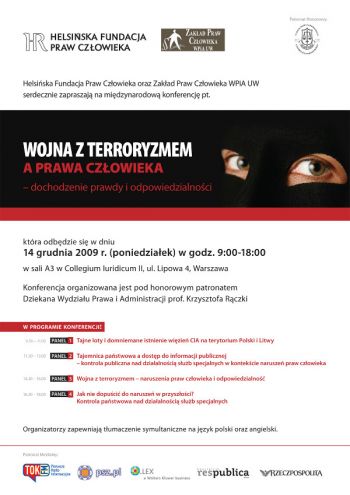This was one of the events within HFHR’s project aimed at establishing an independent investigation of CIA secret rendition and detention programme in Poland with recourse to the law on access on public information. The aim of the conference was to analyse situation in Poland with respect to allegations on existence of secret CIA detention centers in the north of Poland (Stare Kiejkuty) and the involvement of Poland in CIA secret rendition programme.

The conference was opened by the President of the HFHR (Danuta Przywara) and the Vice-Dean of the Law Faculty (Dr Elżbieta Mikos-Skuza). Prof. Andrzej Rzepliński an excellent and distinguished human rights lawyer who had worked for many years at the HFHR and currently a judge at the Polish Constitutional Court moderated the first panel. Dr Adam Bodnar and Dorota Pudzianowska, both working for the HFHR and Warsaw University Law Faculty summarised state of knowledge with respect to Poland’s involvement in CIA secret rendition and detention programme. They made reference of the fact that Poland was one of the CEE countries named in reports published by Human Rights Watch and articles in the ‘Washington Post’ in November 2005 as hosting CIA black sites and that it is now officially confirmed that CIA planes landed in Poland at Szymany airport. Monika Płatek, a professor of criminal law at the same Faculty discussed potential liability of Polish politicians and intelligence services agents engaged in organizing transfer and interrogation of suspects held by CIA.
The issue of conflict between protection of state secrets and access to public information was also discussed during the following session (moderated by Prof. Roman Wieruszewski from the Poznań Human Rights Center). Speakers analysed this problem in the context of freedom of speech (Dr Ireneusz Kamiński from Warsaw Academy of Sciences) and public control over activities of intelligence (Piotr Niemczyk, expert of the Parliamentary Commission for Special Services). Darian Pavli from Open Society Justice Initiative talked about the ‘right to the truth’ doctrine and how most European countries have failed to come clean in practice.
The third panel was moderated by Polityka weekly journalist Wawrzyniec Smoczyński. Mathias Vermeulen (assistant to Prof. Martin Scheinin, Special UN Rapporteur on the promotion and protection of human rights and fundamental freedoms while countering terrorism) spoke on efforts of the Obama administration to hold the CIA accountable for human rights violations. Extraordinary rendition and international human rights law was a subject of interest for the next speaker, Vesselina Vandova (Coordinator of the Security and Rule of Law Program at INTERIGHTS) who made a presentation on possible successful litigation in the European Court of Human Rights. Draginija Nadazdin from the Warsaw office of Amnesty International made a statement on effort to hold Polish authorities accounatble for possible human rights violations in the context of secret rendition.
The issue of how to prevent human rights violations of the nature that have taken place on Polish territory in the framework of cooperation between Polish intelligence services and CIA (which is now established with a high degree of responsibility) was a subject of the last conference session. Speakers discussed what measures state control over intelligence services activities should be taken in order to prevent future human rights violations. Dr Morton Halperin (senior advisor for the Open Society Justice Initiatives) concentrated on the situation in the USA while Prof. Jan Widacki (Professor of criminal law at the Jagiellonian University) and Józef Pinior (former MEP) elaborated on the vices of the current model of control over intelligence agencies in Poland. Expert on security issues, Prof. Krzysztof Kubiak discussed moral issues involved in decisions on methods to be used in countering terrorism. This last session was moderated by Dr Piotr Kładoczny, Assistant Professor of criminal law at the Warsaw University Law Faculty and a lawyer at the HFHR.
The conference attracted many human rights lawyers, academics and students from Poland as well as from abroad. Polish journalists covered the event with press articles and radio broadcasts. We hope that it will help the public in Poland to form their opinions on this very critical issue the problem of human rights violations in the context of war on terror.
Adam Bodnar
Dorota Pudzianowska


